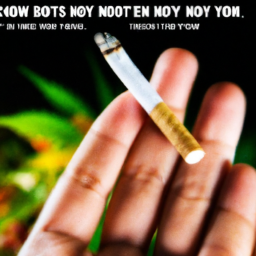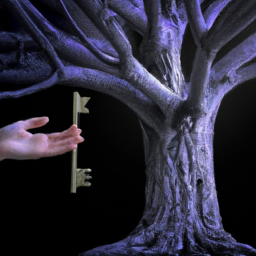I have always been intrigued by the realm of dreams. The ability of our minds to create detailed images and stories while we are asleep is truly fascinating. However, I have noticed something interesting as a occasional marijuana user – when I smoke before going to bed, I do not seem to experience any dreams at all. It’s as if my mind becomes completely empty.
This got me wondering – why does smoking weed stop dreams? To answer this question, I did some research and found that there are a few different theories out there. Some suggest that marijuana affects the REM stage of sleep, which is when most dreaming occurs. Others believe that it simply dulls the brain’s ability to remember dreams. And of course, there are also personal experiences to consider.
As someone who has experienced this firsthand, I’m eager to explore the science behind it all and get some answers.
Key Takeaways
- Marijuana affects the REM stage of sleep, reducing the amount of REM sleep and suppressing dreaming.
- THC interacts with specific receptors in the brain’s endocannabinoid system, leading to changes in mood, perception, and cognition.
- THC binds to CB1 receptors, reducing the time spent in REM sleep, leading to fewer dreams or a complete lack of dreaming.
- Theories on why smoking weed can stop dreams include interference with the REM stage of sleep, alteration of sleep cycles, and impairment of memory recall.
Understanding the Science Behind Dreams
Want to know the science behind our wildest dreams? Let’s dive into how our brains process and create these subconscious adventures.
Dreams are a fascinating phenomenon that occur during our sleep cycle. They are a result of our brain’s activity during the Rapid Eye Movement (REM) stage of sleep. During this phase, our brain is highly active, and our body is in a state of paralysis. This state allows us to experience vivid and often bizarre dreams that range from pleasant to terrifying.
The brain’s activity during the REM stage is similar to when we’re awake, but it’s not the same. The prefrontal cortex, responsible for logical thinking and decision-making, is inactive during this phase. This inactivity allows the brain to process emotions and memories that we may not have fully processed during the day. These emotions and memories may appear in our dreams as symbols or metaphors.
Now, let’s explore the effects of marijuana on sleep.
The Effects of Marijuana on Sleep
I’ve always been curious about the effects of marijuana on sleep, especially since I’ve heard that smoking weed can stop dreams.
After doing some research, I found that THC, the main psychoactive compound in marijuana, interacts with certain receptors in the brain that affect sleep.
Additionally, studies have shown that marijuana use can reduce the amount of REM sleep, which is the stage where most dreaming occurs.
How THC Interacts with the Brain
You’ll be fascinated to learn that THC, the main psychoactive component of marijuana, interacts with the brain by binding to specific receptors that are involved in regulating mood, memory, and sleep. These receptors are located in the brain’s endocannabinoid system, which plays a crucial role in maintaining homeostasis and regulating various physiological processes.
When THC binds to these receptors, it can alter the normal functioning of the endocannabinoid system, leading to changes in mood, perception, and cognition.
One of the most significant effects of THC on the brain is its impact on the sleep cycle. THC has been found to reduce the amount of rapid eye movement (REM) sleep, which is the stage of sleep associated with dreaming. This is why many people report a decrease in dream activity when they smoke marijuana before bed.
The connection between marijuana and REM sleep is complex and still not fully understood, but it is thought to be related to the way THC affects the brain’s neurotransmitter systems.
The Connection Between Marijuana and REM Sleep
If you’re a regular marijuana user, you may have noticed that your dreams become less vivid after consuming it before bed due to the way THC affects your brain’s REM sleep cycle. During REM sleep, the brain is highly active and dreams are most vivid.
However, THC, the main psychoactive compound in marijuana, can interfere with this process. Studies have shown that THC suppresses REM sleep, which can lead to a reduction in dreaming. This is because THC binds to the CB1 receptors in the brain, which are involved in regulating sleep.
By binding to these receptors, THC can reduce the amount of time spent in REM sleep, leading to fewer dreams or a complete lack of dreaming. But why does this happen? Let’s explore some theories on why smoking weed can stop dreams.
Theories on Why Smoking Weed Can Stop Dreams
There are several theories on why smoking weed can stop dreams. Here are some of them:
-
THC, the psychoactive compound in marijuana, can affect the brain’s ability to produce and recall dreams. This is because THC can interfere with the REM stage of sleep, which is when most dreaming occurs. By disrupting REM sleep, marijuana can reduce the amount and intensity of dreams a person experiences.
-
Another theory is that smoking weed can alter a person’s sleep cycles, leading to less time spent in REM sleep. This is because marijuana can affect the release of certain neurotransmitters and hormones that regulate sleep, such as dopamine and melatonin. By changing the balance of these chemicals, marijuana can disrupt the normal sleep pattern and reduce the occurrence of dreams.
-
Finally, some experts suggest that the absence of dreams while smoking weed may simply be due to a lack of memory recall. Since marijuana can impair short-term memory, it may be more difficult for a person to remember their dreams upon waking up. This could give the impression that they are not dreaming at all, when in fact they simply cannot remember their dreams.
Speaking from personal experience, I’ve noticed a significant decrease in the number and vividness of my dreams when I smoke weed before bed. However, this doesn’t mean that I never dream at all while under the influence of marijuana. In fact, sometimes I have very strange and surreal dreams that I can only attribute to the effects of THC on my brain. Nevertheless, the relationship between marijuana and dreams is complex and varies from person to person.
Personal Experiences with Marijuana and Dreams
Interestingly enough, whenever I indulge in some cannabis before bed, my dreams tend to become more vivid and surreal than usual. I find myself remembering every detail and feeling as if I’m living in a completely different reality. It’s almost as if the marijuana enhances my imagination and allows me to experience a more intense dream state.
However, I’ve also noticed that if I use marijuana consistently for a prolonged period of time, my dreams begin to decrease in frequency and intensity. It’s as if the drug is suppressing my natural ability to dream. While I enjoy the heightened dream state that marijuana can provide, I do miss the natural, spontaneous dreams that I experience when I’m not using the drug.
Frequently Asked Questions
What are some other factors that can affect dream activity besides smoking weed?
Other factors that can affect dream activity include stress, medication, alcohol, and sleep disorders. Personally, I’ve noticed that eating heavy meals before bed can also impact my dreams.
Is there a specific strain of marijuana that is more likely to cause a decrease in dream activity?
Wow, let me tell you, some strains of marijuana completely knock out my dreams. It’s crazy how vivid and intense they can be one night, and then completely nonexistent the next. But to answer your question, I haven’t noticed a specific strain that consistently causes a decrease in dream activity.
Can smoking weed actually improve the quality of sleep for some individuals?
Smoking weed can improve the quality of sleep for some individuals by reducing anxiety and pain, leading to longer and deeper periods of rest. However, it can also disrupt REM sleep, causing a decrease in dream activity.
Are there any potential long-term effects on dream activity for individuals who frequently smoke weed?
As someone who frequently smokes weed, I’ve noticed a decrease in my dream activity. Research suggests that long-term marijuana use can disrupt REM sleep, hindering the brain’s ability to properly process and recall dreams.
Is there any evidence to suggest that smoking weed can enhance lucid dreaming abilities?
I haven’t found evidence to suggest that smoking weed enhances lucid dreaming abilities. However, it’s known to suppress REM sleep, which is essential for dreaming. This may explain why some people report fewer dreams after smoking.
Conclusion
In conclusion, smoking weed has been shown to impact our ability to dream. While the science is still inconclusive, personal experiences and theories suggest that marijuana’s effect on REM sleep is the likely culprit.
For some, this might be a welcome side effect, but for others, it could be a hindrance to their mental and emotional health. Smoking weed stopping dreams is like a fog settling over a landscape, obscuring the intricate details that make it beautiful and unique.
While the haze of marijuana may provide temporary relief, it ultimately masks the vivid experiences that our minds are capable of creating during sleep. Whether one chooses to embrace or avoid this effect, it’s important to understand the science behind it and make informed decisions about our use of marijuana.










